|
|
|
Sort Order |
|
|
|
Items / Page
|
|
|
|
|
|
|
| Srl | Item |
| 1 |
ID:
189866
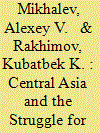

|
|
|
|
|
| Summary/Abstract |
The paper discusses the “struggle for Soviet legacy’ as a key concept for
understanding relations in Central Asia. This struggle is a path of dependent
development, in which the resources and values created in Soviet times
determine interstate relations in the 21st century. The authors argue that in
Central Asia this legacy rests mostly on the mega industries created during
the Soviet era, and national resources and practices of their distribution.
The paper concludes that in fact the struggle for Soviet legacy means
confrontation over the contours of new geoeconomics in Asia.
|
|
|
|
|
|
|
|
|
|
|
|
|
|
|
|
| 2 |
ID:
121351


|
|
|
|
|
| Publication |
2013.
|
| Summary/Abstract |
Ecuador's energy policy faces a complex variety of political and economic objectives that are difficult to reconcile in a consistent manner. Ecuador is a small oil producer and exporter with significant renewable (mainly hydropower) resources, hosting some of the richest biodiversity areas in the world, part of which are inhabited by so far indigenous un-contacted people. Being a developing country, tensions arise between conservation aims and development imperatives, as well as between resource nationalism and much-needed foreign financing. However, the really limiting factor for the country's energy development seems to be its constraints in financing the government's development and redistributive policies. Resorting to Chinese loans-for-oil may be part of the solution in the short term, but it does not substitute for a more consistent energy policy. Ecuador's case illustrates the dilemmas of energy policy in natural resource-rich developing countries when confronted with diverging political economy, social, environmental and macro-financial goals.
|
|
|
|
|
|
|
|
|
|
|
|
|
|
|
|
| 3 |
ID:
159402
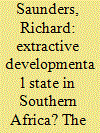

|
|
|
|
|
| Summary/Abstract |
In recent years, an upturn in international commodity markets and the poor development performance of mineral rich African countries have catalysed the resurgence of debate and policy initiatives focused on extractivist models of growth in southern Africa. Beginning with debates on the ‘resource curse’, the East Asian developmental state and ‘developmental patrimonialism’, we extend the discussion to consider key unique challenges in contemporary African states: questions of finance and debt leverage, foreign capital domination and the problematic legacy of neoliberal structural adjustment. We consider the cases of Zambia and Zimbabwe, two countries heavily reliant on mining, in which current policy interventions have sought to anchor developmental state ambitions in the restructuring of the minerals sector. These cases illuminate the significance of current developmentalist politics in southern Africa, and underscore their specificity and constraints. Developmentalist projects are unlikely to succeed in the short term, but retain importance as emerging points of critique of neoliberal states in transition.
|
|
|
|
|
|
|
|
|
|
|
|
|
|
|
|
| 4 |
ID:
109697
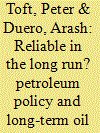

|
|
|
|
|
| Publication |
2011.
|
| Summary/Abstract |
Accelerating oil import dependence in energy consuming nations highlights the importance of having energy supplies at sufficient levels and at stable and reasonable prices. Consequently, it is crucial that oil exporters realize their full production potential. Current debates on energy security are often focused on short-term risks e.g. sudden disruptions due to wars, domestic instability, etc. However, when it comes to assessing oil supplier reliability it is equally important to assess their longer term ability and willingness to deliver oil to the global market. This study analyzes the effects of petroleum investment policies on crude oil production trends in 14 major oil producing countries (2000-2010) by focusing on the political-institutional frameworks that shape the investment conditions for the upstream oil sector. Our findings indicate that countries with less favorable oil sector frameworks systematically performed worse than countries with investor friendly and privatized sectors. The findings indicate that assessments based on remaining reserves and planned production capacities alone could inflate expectations about future oil supplies in a world where remaining crude reserves are located in countries with unfavorable investment frameworks.
|
|
|
|
|
|
|
|
|
|
|
|
|
|
|
|
| 5 |
ID:
092788


|
|
|
|
|
| Publication |
2009.
|
| Summary/Abstract |
This paper analyses the connection between resource nationalism and financial sector intervention in the FSU countries. We consider recent financial development in the FSU and the special features of energy rich emerging economies (Russia and Kazakhstan, in particular) which are influencing recent credit expansions. We find that the hydrocarbon sector has boosted boosting domestic credits through a number of direct and indirect routes. Recent decline in oil prices may change government attitudes to a continued resource nationalist strategy. Sovereign wealth funds that were established in a majority of energy rich emerging economies may, to the extent that they enable the selection of winners in specific economic sectors, create path dependency or exacerbate longer term allocative inefficiency arising from the governance structure associated with resource nationalism.
|
|
|
|
|
|
|
|
|
|
|
|
|
|
|
|
| 6 |
ID:
156422
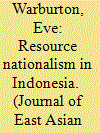

|
|
|
|
|
| Summary/Abstract |
During the global commodities boom Indonesia, like many resource-rich countries, introduced an increasing number of nationalist policy interventions. However, the state has intervened assertively in some sectors and only passively in others. In Indonesia's mining sector, interventions that compel foreign divestment received widespread support from politicians and domestic industry; yet similar proposals to limit foreign investment in the strategic agribusiness sector have largely failed. This article brings the literature on resource nationalism into conversation with studies of business–state relations, in order to understand why nationalist mobilization met with more success in Indonesia's mining sector than in agribusiness. It argues that ownership structures constitute the source of this variation. Uniquely integrated patterns of domestic and foreign ownership in the strategic palm oil sub-sector constrained lawmakers’ nationalist agenda. Such constraints were less formidable in Indonesia's mining sector, where foreign capital is more easily differentiated, and concentrated in a sub-sector that contributes less overall to the Indonesian economy.
|
|
|
|
|
|
|
|
|
|
|
|
|
|
|
|
| 7 |
ID:
137725
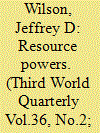

|
|
|
|
|
| Summary/Abstract |
The rise of new economic powers has seen increasing attention focused on the international role of the BRICS countries. Importantly, a common feature uniting the BRICS is that they are all resource-rich, and many analysts (and some BRICS governments) have argued that natural resources are one of the key factors propelling the rise of the group. This article explores the BRICS’ emerging status as ‘resource powers’, examining how resource wealth underpins their economic development and foreign policy strategies, and thus contributes to their growing influence in international affairs. It is argued that through the use of nationalistic mining and energy policies, the BRICS governments have exploited natural resources for both domestic economic and international diplomatic objectives. However, there are several challenges and emerging risks facing the BRICS’ resource strategies, which mean that resource wealth is making a positive – though inherently limited – contribution to the growing international status of the group.
|
|
|
|
|
|
|
|
|
|
|
|
|
|
|
|
| 8 |
ID:
136233
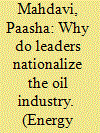

|
|
|
|
|
| Summary/Abstract |
Why do leaders nationalize the oil industry? In line with a general utility-maximizing theory, I argue that leaders nationalize to maximize state revenues while minimizing costs. The latter includes international retaliation and domestic political constraints. Using a novel longitudinal dataset on the establishment of national oil companies (NOCs), the empirical evidence presented in this paper lends support to four primary findings. States are most likely to establish NOCs (1) in periods of high oil prices, when the risks of expropriation are outweighed by the financial benefits; (2) in non-democratic systems, where executive constraints are limited; (3) in “waves”, that is, after other countries have nationalized, reflecting reduced likelihood of international retaliation; and, though with weaker empirical support, (4) in political settings marked by resource nationalism. This last factor is proxied by OPEC membership in large-N analysis and, in a two-case comparison, by the difference in retained profits between the host and foreign governments. The theory and empirics presented here offer some clues for policy makers and multinational companies alike as to when to expect leaders to opt for nationalization.
|
|
|
|
|
|
|
|
|
|
|
|
|
|
|
|
|
|
|
|
|